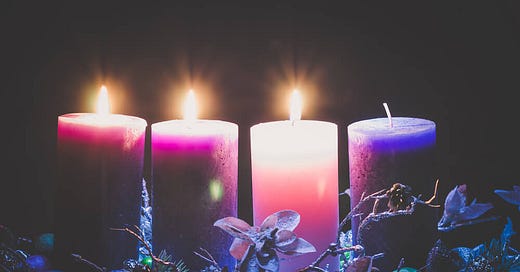Liturgical colors—those featured in various Holy Days and Holy Seasons—do more than remind us of what season we are in. (Though that is always helpful.) In a future post we’ll explore the ins and outs of these colors—what they signify and what they do to us.
But I mention colors this week because you have likely noticed that Advent candles are not uniform in color: most of the candles are purple (the color of the season), and there is sometimes a white or gold candle in the center to be lit on Christmas Day. But there is also a seemingly misplaced pink candle that is to be lit on the Third Sunday of Advent.
Continue reading to discover why the candle is pink (hint: it isn’t actually pink), what to focus on during this third week of advent, and even a bonus micro-lesson on Latin verb conjugation!
Rejoice
The color for the Third Sunday of Advent is not technically pink, but rather rose. Rose is the liturgical color for rejoicing. The only other time rose is used liturgically throughout the year is on Laetare Sunday in the season of Lent. In both cases, rose is a call to rejoice even while living within a season of penitence.
Advent is a penitential season; a time to reflect on our need for a savior and in doing so, to anticipate the advent of that savior. As we have mentioned previously, it is even common practice to fast in some way throughout the season.
As much as we should reflect, repent, and anticipate, there is also reason to rejoice throughout Advent. The coming of Jesus is, after all, good news.
In this spirit, the Third Sunday of Advent is traditionally known as Gaudete Sunday. Gaudete is latin for rejoice, but it is worth noting that it is actually the second-person plural present active imperative form of the word gaudeo (rejoice).
In other words: gaudete is a command (imperative) for all of us (second-person plural) to rejoice this week (present active).
The readings and prayers for this week of Advent are still calling us to reflect, repent, and anticipate, but there are signs of rejoicing throughout. In the Gospel reading the blind see, the dead are raised, the poor have good news brought to them, and in our Collect we ask God to come among us to do the same.
At this point, we are halfway through the season of Advent.
While Gaudete Sunday is more than a pick-me-up in the middle of the season, it is not less than that. In practice, it would be liturgically appropriate—even encouraged—to find a way to rejoice this week. Don’t spoil the anticipation entirely by abandoning your whole fast, or raiding the Christmas tree and stockings early. But perhaps you can intentionally modify your fast—skip one element and feast instead—or otherwise mark this week as one of rejoicing that Jesus is coming among us.
Gospel Reading
Matthew 11:2-11
When John heard in prison what the Messiah was doing, he sent word by his disciples and said to him, “Are you the one who is to come, or are we to wait for another?” Jesus answered them, “Go and tell John what you hear and see: the blind receive their sight, the lame walk, the lepers are cleansed, the deaf hear, the dead are raised, and the poor have good news brought to them. And blessed is anyone who takes no offense at me.”
As they went away, Jesus began to speak to the crowds about John: “What did you go out into the wilderness to look at? A reed shaken by the wind? What then did you go out to see? Someone dressed in soft robes? Look, those who wear soft robes are in royal palaces. What then did you go out to see? A prophet? Yes, I tell you, and more than a prophet. This is the one about whom it is written,
‘See, I am sending my messenger ahead of you,
who will prepare your way before you.’
“Truly I tell you, among those born of women no one has arisen greater than John the Baptist; yet the least in the kingdom of heaven is greater than he.”
Collect of the Week
Stir up your power, O Lord, and with great might come among us; and, because we are sorely hindered by our sins, let your bountiful grace and mercy speedily help and deliver us; through Jesus Christ our Lord, to whom, with you and the Holy Spirit, be honor and glory, now and for ever. Amen.




